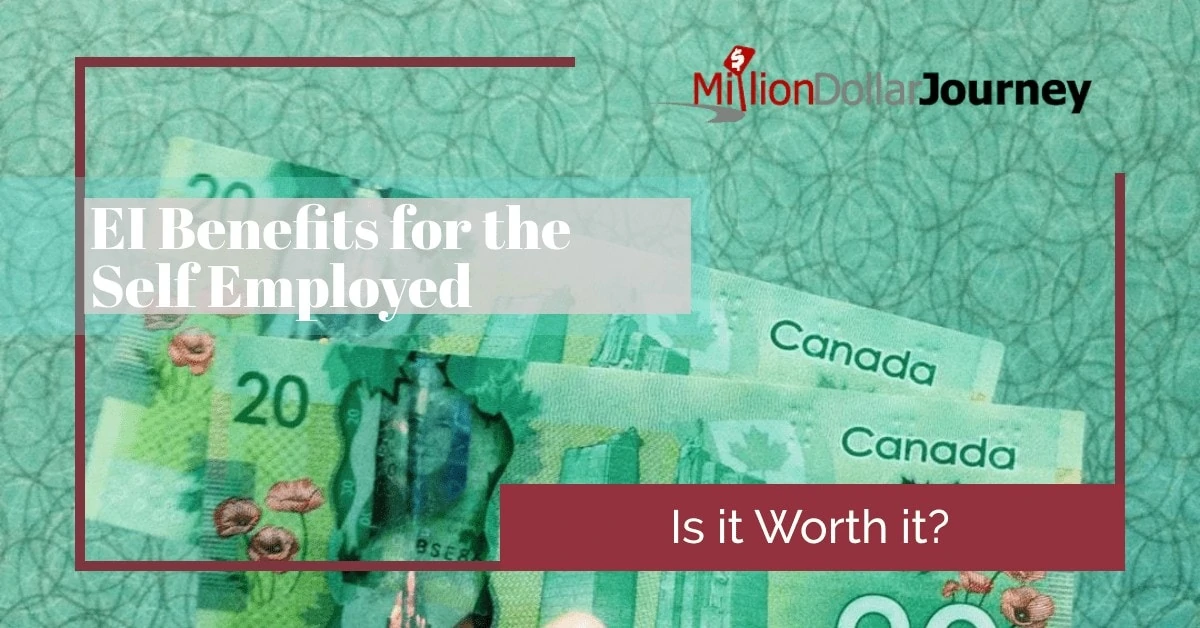EI Benefits for the Self Employed
Today we’re going to cover the employment insurance (EI) benefits that you can receive, as a self-employed individual.
Perhaps the most important thing to understand, is that while you can receive a significant amount in EI benefits as a self-employed person, you are not automatically signed up to receive them, and you do not receive them for free.
Hence, the big decision that you have to make as someone that is self-employed, is whether you want to pay into the premiums in order the receive the EI benefits when you need them.
How Much Can I Expect to Receive?
According to the Government of Canada:
“If you are eligible for maternity, standard parental, sickness, compassionate care or family caregiver benefits you can expect to receive 55% of your earnings from self-employment up to a maximum amount.
For extended parental benefits you can expect to receive 33% of your earnings from self-employment, up to a maximum amount.
In 2020, you can receive up to $573 per week for maternity, standard parental, sickness, compassionate care or family caregiver benefits, based on the maximum insurable earnings of $54,200 for that year.
For extended parental benefits you can receive up to $344 per week. (The amount of $344 can be increased if you are eligible to receive the Family Supplement).
The amount of your benefits may decrease if you continue to work or if your business generates earnings while you are collecting EI special benefits.”
(You can get the source and their full details here)
While that definitely sounds great, you do actually have to register for EI and continuously pay into it in order to receive these payouts.
So, how much will these benefits cost you every month?
Your Cost to Receive the EI Benefits:
According to the Government of Canada, in 2020, for every $100 you earn, you will need to contribute $1.58 in EI premiums up to a maximum of $856.36 (for the year 2020).
A common misconception is that since you are both the owner and employee of your own business, you have to pay both the employer portion of the EI, and the employee portion of the EI (i.e. paying it twice). This is not the case. You do not have to pay the employer’s portion of the EI.
Before moving forward, it is important to mention that there are numerous nuances when it comes to EI for the self-employed, depending on your situation.
For example, the rules are different if you are in Quebec, if you have a specific type of job, if you are a shareholder of the company with a specific percentage of voting shares, and others. Therefore, since the premiums that you are paying are significant, and since it can be difficult to cancel (more on that later), definitely be sure to read through the details here, as well as call Service Canada if you are not sure about something as it pertains to your specific situation.
Can You Cancel if You No Longer Wish to Pay the Premiums?
This is perhaps one of the biggest considerations to think about as you can’t simply cancel whenever you want, and once you start, you may actually be forced to pay the premiums for the rest of your self-employed career!
The way the rules work, is that once you sign up, you have 60 days to cancel (in case you changed your mind). If you do this, you won’t have to pay any premiums.
After this 60 day period however, the rules get very strict. According to the Government of Canada:
“After this 60-day period, you may still terminate your participation if you have never received EI special benefits as a self-employed person. In other words, after you receive EI special benefits, your participation will continue and you will have to continue to pay EI premiums for the entire duration of your self-employed career, regardless of any change in the nature of your self-employment.”
(Source)
It’s also worth mentioning that they do not issue refunds on any EI premiums that you may have paid.
So in other words, not only do you not get any of the money back that you contribute (if you don’t make a claim), but you also can’t leave the program if you ever do receive any of the EI benefits.
My Thoughts?
Personally, not being able to leave (if benefits have ever been paid out) is what scares me the most when it comes to this proposition. Life changes, things happen, and so to potentially be stuck paying these premiums for as long as I want to be self-employed sounds like a very inflexible thing that I take great reluctance in participating in.
Obviously this all depends on your situation and personal preferences and so I’m not saying that you should or shouldn’t participate in this program.
I am however saying, that it is something where the pros and cons have to be really thought about, as it’s definitely not a free lunch, and it is a commitment (with significant payments) that you may be stuck in for decades.
All-in-all, I’m happy that a program like this exists for Canadians. More options is definitely better than no options, and it’s nice to not be forced to fully self-insure against major disruptions in your ongoing income.
Like home and auto insurance, I find that it also does provide a good piece-of-mind against some catastrophic events (in this case, disruptions in your income).
However, personally, I do feel more comfortable with self-insuring against such distributions, as I tend to shy away from the inflexibility of potentially multi-decade long financial commitment that I have no way of getting out of. I also don’t like the guaranteed and immediate cashflow drain for something that I may never actually use.
Keep in mind though, that our situation is different than average since we already hit our financial independence number and can just live off our portfolio indefinitely. If on the other hand, we were a single income family with multiple kids, maybe more kids on the way, and a small cash cushion, then my decision may be entirely different.
Once again, it really depends on your situation, your plans for the future, and the level of uncertainty that you feel comfortable with. For example, whether you plan on having more kids and want to continue receiving some income while you are busy taking care of them.
Who Is Eligible for Self-Employed EI?
In order to be able to register, there are also certain conditions that must be met.
I’ve taken the list of conditions below directly from the Government of Canada Site:
- Your registration for access to the EI Program must still be valid (that is, not terminated), and
- You must have reduced the amount of time devoted to your business by more than 40% because of:
- the birth of a child
- the need to care for your newborn or newly adopted child or children
- illness, injury, or quarantine
- the need to provide care or support to a gravely ill family member, or
- the need to provide care or support to your critically ill or injured family member
- You must have earned a minimum specified amount of net self-employed earnings during the calendar year before the year you submit an EI claim (for claims filed in 2020, the minimum amount of 2019 net income is $7,279)
Also, once you are part of the program, there are only a certain number of conditions in which you are entitled to receive the benefits.
I’ve included them below for easy reference (they are copied and pasted right from the government’s site).
Also keep in mind that to actually receive the benefits, you have to provide the sufficient proof such as medical certificates, the birth date of the child, etc. (depending on the reason for claiming these benefits).
Here they are, from the Government’s EI special benefits for self-employed people guide):
- Maternity benefits are for people who are away from work because they’re pregnant or have recently given birth (up to 15 weeks).
- Parental benefits are for any parent (mother or father) to care for their newborn or newly adopted child or children. The benefits are available to biological, adoptive, or legally recognized parents. There are two options available for receiving parental benefits: standard or extended.
- Standard parental benefits can be paid for a maximum of 35 weeks and must be claimed within a 52 week period (12 months) after the week the child was born or placed for the purpose of adoption. Standard parental benefits are paid at a weekly benefit rate of 55% of the claimant’s earnings from self-employment, up to a maximum amount.
- Extended parental benefits can be paid for a maximum of 61 weeks and must be claimed within a 78-week period (18 months) after the week the child was born or placed for the purpose of adoption. Extended parental benefits are paid at a weekly benefit rate of 33% of the claimant’s earnings from self-employment, up to a maximum amount.
Either parent can receive parental benefits, or they can share the benefits between them. If both parents share the benefits, they must receive them under the same option.
- Sickness benefits are for people who cannot work due to injury, illness, or the need to be isolated in quarantine because they may be carrying a disease (up to 15 weeks).
- Compassionate care benefits are for caregivers who must be away from work temporarily to provide care or support to a person who is seriously ill with a significant risk of death (up to 26 weeks). The 26 weeks of benefits can be shared between different caregivers who applied and are eligible to receive them.
- The family caregiver benefit for children is for caregivers who must be away from work to provide care or support to a critically ill or injured child under 18. Either one or more caregivers can share up to 35 weeks of benefits between them.
- The family caregiver benefit for adults is for caregivers who must be away from work to provide care or support to a critically ill or injured adult. Either one or more caregivers can share up to 15 weeks of benefits between them.
How Do You Register for EI When Self-Employed?
This is all done through your “My Service Canada” account. Once you are logged in, select “Employment Insurance for the Self-Employed” on the main page to begin the process.
If you are having trouble, you can contact them and receive additional information here.
Your Thoughts?
I’d love to hear your thoughts about this benefit in the comments section below. Is this something that you think would be a good fit for you? Do you think the pros outweigh the cons in most cases?











How can the government single out one group of individuals when there are so many other hard working people looking for work but are in a different career category. It seems that Fishermen get the best benefit of all as they claim EI and only have to show that they have made little money fishing during the duration. Some of these Fishermen now take work under the table and claim everything, get EI and get paid cash with no tax. I see that this is very unfair as there are so many individuals that work in Technology fields like Graphic Designers/Web Designer, Art fields such as painters and many more that would really benefit themselves for receiving EI just like fishermen.
This is my rant for the day but if you do not believe me please check out http://www.servicecanada.gc.ca/eng/ei/types/fishing.shtml. It may change your career path to having a year-round vacation, kicking up your feet and grabbing a cold case of beer.
Hi Vicki,
I am in the exact same position, I am due in september, and I have opted into the program…I don’t think we can start drawing benifits until January 2011, (provided you signed the right paperwork on or before april first of this year saying you were opting into the program)
I am just going to tough it out and go back to work 2-3 weeks after I have my baby..and my husband will stay at home with our baby..once January comes, I will apply for both maternity and parental…but may only be eligable for parental benifits..I might try applying in september…just so they are aware I am trying to establish a claim..and see what happens..I can only assume we will have to wait until January…
To all of you who disagree with this…I respect..and understand your options..but from the point of view of a young entraprenuer and soon to be mother..until now I have had to put my plans of starting a family on hold. This program is exactly what is needed. Self employed women make up 80% of the self employed statistic..and some of us do have a desire to maintain our careers and raise our families.
This program is not for everyone..and does not apply to everyone…but the expense of opting into the program..and paying premiums..is the price self employed mothers to be may be willing to pay in order to take time from work and raise a child…
in my opinion….this program is very fair. Your either someone who opts out entirely now..with no changing your mind later…. or your someone who *may* need to use the program someday..if you decide to start a family or have a family member with major health issues.
You can’t just decide to opt out now…get pregnant..opt in later..and then opt out when it’s all said and done, so to whomever posted that comment…you should check out the service canada website under self employed and read up on the program first…
I still have the issue of who is going to run my business while I am off…and I am making arrangements to do so…hopefully…having benifits to cover some of my own wages while i am off…will allow me to hire someone who can work for me until I am able to come back to work…my business IS probably going to suffer…but…you only get one chance at being a mom..and right now raising a family is more important to me..no matter HOW hard I’ve worked to establish my career.
I’m sure there will always be divided options on this topic..but some of us need this program..and if you disagree, or it is not for you…just OPT out and let those of us who need it support it.
I have a question if anyone knows the answer that would be so helpful! I am currently a self employed home daycare provider. I am pregnant and due October 2010. Everything I am reading on the gov’ websites are saying that I can start paying into the self employment program before April 1st and claim benefits starting Jan 1 2011. Since I am having the baby in October before I can make a claim will I be eligible to make a maternity or parental leave claim 3 months after the baby is born?? Thanks =)
Personally, I wouldn’t touch this with a 10 foot pole. I am fullt self-employed now and have been for 6 years. I have taken all that EI premiums and self-insure. Prior to being self-employed I enquired about EI benefits and it was far less than 39 weeks … I am past the child/maternity age age too … This program will b e used by the self-employed who are really on the lower wage end and are seasonally unemployed … Professionals earning over the max. allowable will not go into this.
More politics than policy.
If the self-employed won’t have access to *regular* unemployment benefits and only parental and other “special” benefits, then I don’t think they should be paying the same premium — that’s simlpy not equitable.
I actually like the Quebec model, where parental benefits have been factored out into a separate premium and plan, QPIP “Quebec Parental Insurance Plan”, separate from regular EI. That way, you’re paying just for the “special benefits” and not wasting money on regular benefits you’d never be able to claim as a self-employed individual.
However, the Quebec model isn’t voluntary – you must participate in QPIP if you are self-employed. Nevertheless, factoring out the benefits that self-employed people would get makes more sense than bundling them together with non-applicable benefits and corresponding premiums.
I am not too sure to be honest with you about this program, personally I am a big believer of less government involvement. I mean why do we need the government to “share the wealth” around, which is essentially what most government programs do. We all put up the money, some benefit alot more when compared to others, so its never “fair”… I don’t know… I guess I tend to think more different than others and probably more in line with my economic professors at my college.
Till then,
Jean
I think the self employed individual is infinitely better off bypassing the federal system where possible and looking at other sources of unemployment ‘insurance’…like rental income.
Relying on the Govt for anything related to your financial well being is a risky approach at best.
@ 19 CFS: I think that’s one of the benefits of being self employed, beneficial tax treatment. However for many people it is simply too stressful taking care of their own finances to this level. This year is my first year of self employment, and I can definitely say the tax benefits are enormous, and well worth a couple of evenings sorting out paperwork.
ouch!!!!. Thats what I say. There are perks to being Self Employed, and then there are disadvantages. and IE is both an advantage and disadvantage to paying. Its nice to self employed, and skip out on the premium payments, but when and if the well runs dry, it sucks not to have the back up.
One thing I have noticed about “Child Benefit” thing a lot of parents get, is that every single one of my self employed family friends, seem to collect every possible cent from the gov’t every month, because they can cook the books to make themselves into a lower tax bracket.
Just food for thought is all
I remember reading somewhere that a self-employed person will be paying only employee premium though I am not sure. If somebody could dig into the bill itself and find this out, that would be great.
http://canadaonline.about.com/gi/o.htm?zi=1/XJ&zTi=1&sdn=canadaonline&cdn=newsissues&tm=4&f=11&su=p649.3.336.ip_&tt=11&bt=1&bts=1&zu=http%3A//www2.parl.gc.ca/HousePublications/Publication.aspx%3FLanguage%3DE%26Parl%3D40%26Ses%3D2%26Mode%3D1%26Pub%3DBill%26Doc%3DC-56_1